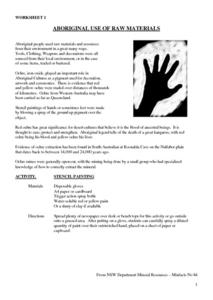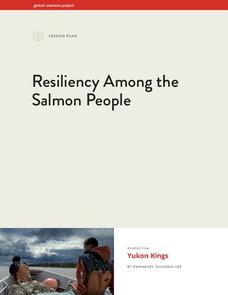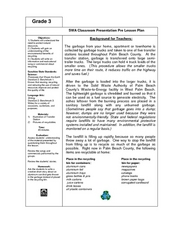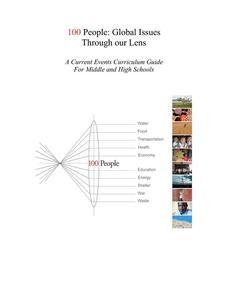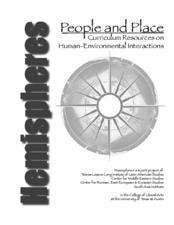Cal Recycle
Conserving Natural Resources
Trying to plan an engaging elementary science unit on natural resources? Conserve your energy! This five-part series of lessons and hands-on activities has exactly what you need to teach young scholars about the importance of conservation.
Indian Land Tenure Foundation
Sharing Resources: The Nuts Game
The land has always provided its inhabitants with resources that allow them to survive. However, sometimes resources run scarce and sharing becomes an important task. Help little ones understand why and how people have shared resources...
Environmental Protection Agency (EPA)
How Much Water Do You Use?
Incorporate reading strategies, math, research, and the scientific method into one lesson about water conservation. After reading a story about a landlady trying to determine how many people are living in an apartment, learners develop a...
DocsTeach
Assimilation and the Native People of Metlakahtla, Alaska
Fitting in to a dominant culture comes at a price—especially for native peoples. Class members consider this concept using a photo matching game of indigenous people in Alaska. Discussion questions help them consider to what extent these...
US National Library of Medicine
Drug Use and Abuse: Past and Present
Pick your poison: tobacco, alcohol, opiates, cocaine, or marijuana. An online exhibition launches a research project that asks groups to select one of the five drugs and gather information on how the use of the drug and the regulations...
K12 Reader
Natural Resources
What natural resources are available in your area? Your learners can consider this question after reading a brief passage about natural and renewable resources. After reading, class members respond to five questions related to the reading.
Education Fund
Fear the Scarce Resources
In a life or death situation, what resources would you choose to survive—and why? A zombie attack simulation teaches learners the concepts of scarcity and resources in regards to economics. The hands-on activity requires individuals to...
K12 Reader
Limited Resources
Here's a comprehension exercise that asks readers to include direct quotes in their analysis of an article on ways to conserve natural resources.
Alcohol Education Trust
Talk About Alcohol: Why Are Young People Advised Not to Drink?
What should young people think about before drinking alcohol? Have your class consider the eight reasons listed here, some of which are facts, and others opinions. Pupils rank each statement from one to eight, where one is the most...
NSW Department Mineral Resources
Aboriginal Use of Raw Materials
What's the difference between base metals and precious metals? Experimenting with natural metals is an interesting way for kids to learn about the world around them. Use a resource that contains over 30 pages of worksheets and...
Global Oneness Project
Resiliency Among the Salmon People
Is losing cultural traditions the cost of social progress, or should people make stronger efforts to preserve these traditions? High schoolers watch a short film about the native Yup'ik people in Alaska and how they handle the shifts in...
Curated OER
Protecting Natural Resources
Third graders recognize what our natural resources are and their importance. In this natural resource recycling lesson, 3rd graders understand why it is important to recycle and conserve natural resources. Students can explain how...
Curated OER
Natural Resources and Ancient Cities
Students explain how the availability of natural resources has affected human settlement patterns. They recognize the interactions of human populations on environments and compare the growth of two ancient cities in relation to natural...
Curated OER
Our Natural Resources
Your class will learn about natural resources and man-made items and differentiate between them. They chart resources from seven pictures and explain how each natural resource is used.
Curated OER
Renewable vs. Non-Renewable Resources
Fifth graders are introduced to the important topic of renewable, and non-renewable, resources. They are expected to be able to correctly categorize different types of resources as renewable or non-renewable. Another emphasis of this...
100 People Foundation
100 People: Global Issues Through Our Lens
If the world were 100 people...17 would not have access to safe drinking water, 18 would not be able to read or write, and 52 would not have a primary education. Using the theme of "100 people," this resource explores other major issues...
Oxford University Press
Vocabulary Unit 5.3: People and Skills, Adjectives
Find out who works in various careers with a vocabulary activity, which features matching activities and a crossword puzzle. Learners use word banks to figure out which skills belong to which career, and then fill in the blanks with...
Anti-Defamation League
Columbus Day or Indigenous Peoples Day?
"Columbus Day"? Indigenous Peoples' Day"? "Native Americans' Day"? The controversy over what to call the federal holiday celebrated on the second Monday in October is the focus of a lesson that asks high schoolers to consider various...
Curated OER
Hemispheres: People and Place
Here is an astounding series of lessons, designed for high schoolers, on environmental policy. By studying water conservation in rural India, the role of the government, and the reaction of the people, learners begin to formulate...
New York City Department of Education
Geography and Early Peoples of the Western Hemisphere
Young historians discover the early people of the western hemisphere. The unit explores how the land changed, how it was used and homes of early Americans such as Incas, Mayans, Inuits, Aztecs, and Pueblos. Individuals also examine these...
Curated OER
Ordinary People: Unsent Letter
Invite your learners to take on the voice of a character from Ordinary People as they write a letter. Pupils use what they know about the given character to compose their letter, which must relate to the plot of the novel.
National Museum of the American Indian
The Kwakwaka'Wakw: A Study of a North Pacific Coast People and the Potlatch
Discover the cultural practices and unique value systems of a group of native peoples from Canada called the Kwakwaka'wakw. Your young historians will discuss how conceptions of wealth can vary and how these native people utilized...
Code.org
Identifying People with Data
How much information about you is out there? Scholars explore this question as they investigate data breaches and how these violations occur. They then take part in an activity where they research how easily people could get access to...
Project WET Foundation
Use Water Wisely
What's the point in saving water? Surprisingly water isn't a forever resource because it is a natural resource. Here, young water conservationists hunt for 23 wise water users and water wasters by clicking on the people in the...











